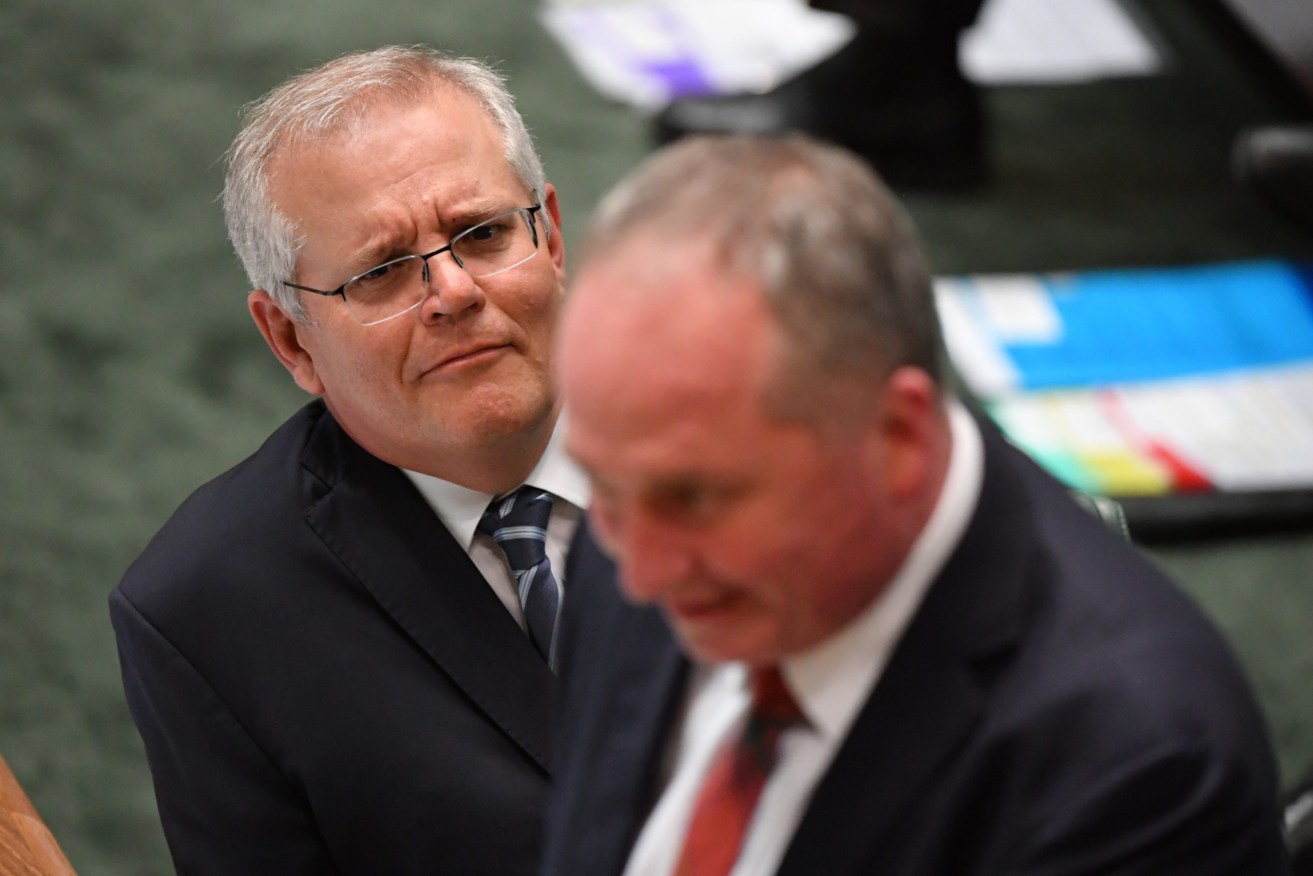Why Scott Morrison should be out of Parliament, and off the payroll, with his mates
The Royal Commission into the Robodebt scandal has not only revealed wrongdoing at the highest levels, but also the disconnect that exists with our national capital, writes Madonna King


Scott Morrison and Barnaby Joyce during Question Time in the previous parliament. (AAP Image/Mick Tsikas)
Was former prime minister Scott Morrison working for us, the nation’s voters, when he made decisions about robodebt; the scheme described by the royal commission as “crude and cruel’’?
No. The Royal Commission, led by Catherine Holmes, found some of his evidence untrue, that he had failed to meet his ministerial responsibilities, and that he allowed Cabinet to be misled.
And for those reasons – irrespective of what the “sealed section” of Holmes’ report says – he should exit Parliament this week. And he should not be paid another cent.
Indeed, should we not be demanding he give back every pay packet he received during the four years of the robodebt fiasco?
His repudiation of the report – that it was wrong, unsubstantiated and contradictory – looks incredulous against the clinical findings of Holmes, a former Queensland chief justice.
The same goes for a queue of other ministers, including Victorian Alan Tudge, Queenslander Stuart Robert and West Australian Christian Porter – who all happen to have left Parliament. But that doesn’t reduce the severity of Holmes’ findings.
Tudge was found to have abused his power, by using information about social security recipients to “distract and discourage commentary about the scheme’s problems’’. Fancy that; sitting in a suit, in a big office, encouraging the media to pick on our most vulnerable!
So where are the consequences for that?
It is time we looked at ways politicians could be made to pay back money earned during the period their decisions were found to be inept or incompetent or cruel.
Why should someone – in the public or private sector – continue to earn hundreds of thousands of dollars when their decisions have cost others so much?
But perhaps, in terms of elected officials, the spotlight should really be put on the role of Stuart Robert, the former minister for government services between 2019 and 2021. The Queenslander quit politics, begrudgingly, several weeks ago.
Robert, in his evidence to the royal commission, showed the danger of the wrong people being elected to power. He claimed that ‘cabinet solidarity’ allowed him to make false statements.
What! Indeed, the report found that Robert cited statistics “which he knew could not be right’’.
So given the public findings – as distinct from those investigations recommended in Holmes’ sealed report – there should not be a get-out-of-jail-free card for Scott Morrison or his merry band of Cabinet colleagues.
This scheme has highlighted the absolute lack of integrity and the ruthless cruelty that can govern decisions that affect the most vulnerable in our community.
But it also shone a torch on senior levels of the public service to highlight behaviour that should worry us all, and provide a salient lesson for every single civil servant enacting or advising government policy.
Holmes’ most savage criticism was directed at very senior public servants like Kathryn Campbell, who led the two responsible departments – Human Services and Social Services – for 10 years.
“Tone comes from the top” was a comment made by Professor Peter Coaldrake, who looked at a lack of transparency and accountability in Queensland.
And it’s just as relevant in the national sphere. A leader sets the tone for a Cabinet. A Cabinet sets the standard MPs will follow. Senior public servants will determine the ethical bar set by those down the line.
Catherine Holmes has provided compelling evidence of leadership failure, across both politics and the public service. We’ve seen it also, in recent months, in the private sector, with the debacle that has engulfed PwC.
We have consequences for criminal actions, but the hundreds and hundreds of pages in Holmes report makes the case for consequences, also, when the leadership is substandard, unethical, nasty or opaque.
And we should heed it, for the sake of all those good pubic servants and private employees down the line.
They deserve better. And as Catherine Holmes made clear, so do we all.












